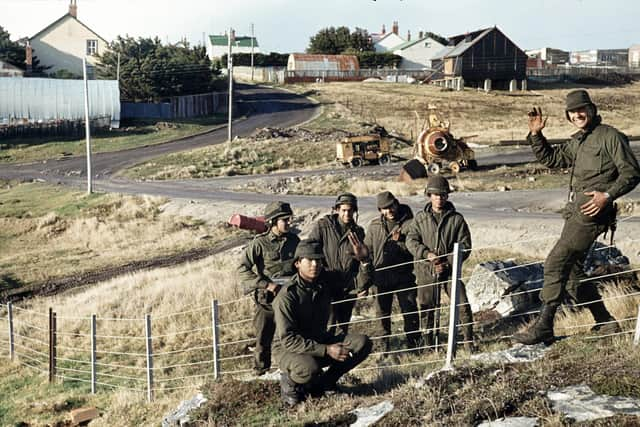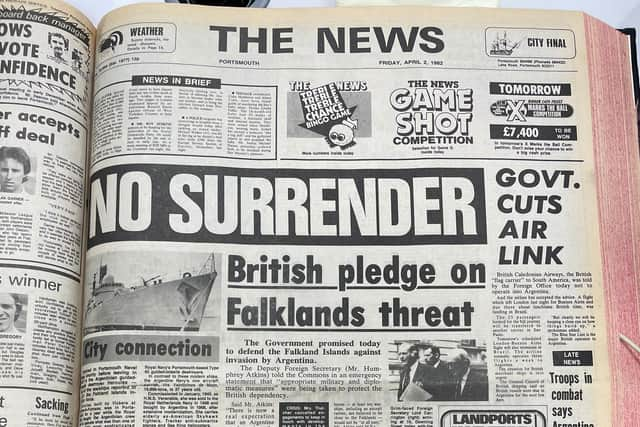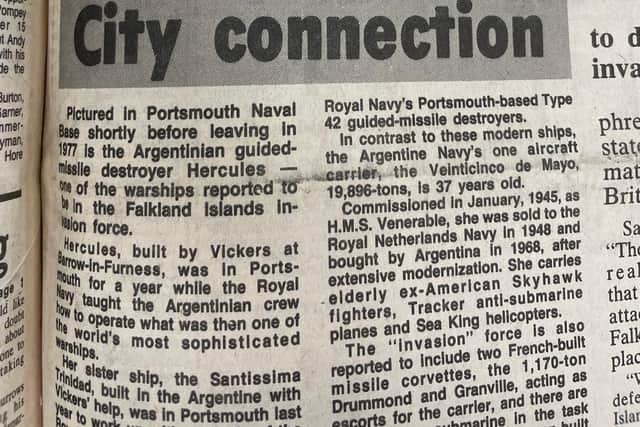Falklands 40: The headlines from The News on April 2, 1982
and live on Freeview channel 276
No Surrender // British pledge on Falklands threat
The Government promised today to defend the Falkland Islands against invasion by Argentina.
The Deputy Foreign Secretary (Mr. Humphrey Atkins) told the Commons in an emergency statement that “appropriate military and diplomatic measures” were being taken to protect the British dependency.


Advertisement
Hide AdAdvertisement
Hide AdHe said: “There is now a real expectation that an Argentine attack against the Falklands will take place very soon. We shall sustain and defend the Falkland Islands to the best of our ability.”
His statement came after an hour-long emergency Cabinet meeting at Downing Street, which was also attended by The First Sea Lord, Adml. Sir Henry Leach and Air Chief Marshal Sir Michael Beetham.
Asked if an initial use of force by Argentina would be the end of the matter, Mr. Atkins said, “No it would not.”
Mr. Atkins would give no details of Britain’s proposed military response.


Advertisement
Hide AdAdvertisement
Hide AdThe Royal Navy also flung a veil of secrecy over any action which might be taken to combat the Argentinian aggression.
Suggestions that the Portsmouth-based aircraft carrier, H.M.S. Invincible, might head a task force of six or seven ships to the South Atlantic, so far appear to have little foundation.
A Defence Ministry spokesman commented tersely: “We do not discuss contingency plans or operational deployments.”
If it was decided to send Invincible to confront the Argentinian Navy, it would take several days to prepare to sail - and at an average speed of 25 knots it would take nearly two weeks to reach the Falklands.


Government cuts air link
Advertisement
Hide AdAdvertisement
Hide AdBritish Caledonian Airways, the British “flag carrier” to South America, was told by the Foreign Office today not to operate into Argentina.
And the airline has accepted the advice. A flight which left London last night for Buenos Aires was landing in Brazil.
The 23 passengers booked for the full journey will be transferred to another carrier in Sao Paulo. The airline normally operates three flights a week to Argentina.
The situation for British merchant ships is less urgent.
The General Council of British shipping said no British vessels were due in Argentina for the next few days.
City connection
Advertisement
Hide AdAdvertisement
Hide AdPictured in Portsmouth Naval Base in 1977 is the Argentinian guided-missile destroyer Hercules - one of the warships reported to be in the Falkland Islands invasion force.
Hercules, built by Vickers, was in Portsmouth for a year while the Royal Navy taught the Argentinian crew how to operate what was then one of the world’s most sophisticated warships.
Her sister ship, the Santissima Trinidad, was in Portsmouth last year to work up with the help of the Royal Navy.
Hercules and Santissima Trinidad are similar in most respects to the Royal Navy’s Portsmouth-based Type 42 guided-missile destroyers.
Advertisement
Hide AdAdvertisement
Hide AdIn contrast to these modern ships, the Argentine Navy’s one aircraft carrier, the Veinticinco de Mayo, 19,896-tons, is 37 years old.
In other news: Cultural link with Poland strengthened
The Polish Ambassador to Britain met the Lord Mayor of Portsmouth (Mr. Frank Sorrell), during a one-day visit to the city.
Ambassador Mr. Stephan Staniszewski was guest of honour at a dinner after the International String Quartet Competition prize winners’ concert held at the Guildhall.
On his visit Mr. Staniszewski was accompanied by the Director of the Polish Culture Institute (Irena Gabor-Jatczak).
Advertisement
Hide AdAdvertisement
Hide AdThe low-key visit was described as a “courtesy call” and the 20-minute discussion centred on future cultural connections between Poland and the city.
He thanked the people of Portsmouth for sending food parcels to Poland and said he hoped to meet the city’s Polish community at a later date.